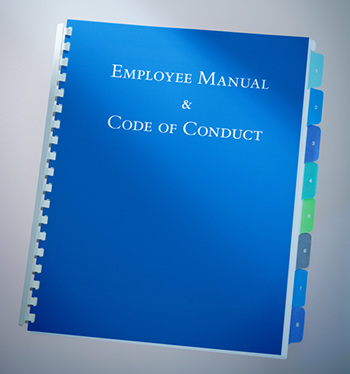

Provide a short welcome message from the owner of your practice, and describe the practice mission, concept, or vision, as well as the principles and ethics that define your practice.
Employment Basics
This section includes the equal employment opportunity statement, your anti-discrimination and anti-harassment policies and whether or not you provide at-will employment (it may depend on your state).
Work Hours and Time Off
- The days and hours the practice is open for business
- The days and hours that staff are expected to be in the office
- Ramifications of repeated tardiness, sick call-outs and asking to leave early
- Lunch and break periods
- Does the office close for lunch at a specified time?
- Do employees take morning and afternoon breaks at will or by schedule?
- Time-off policies for vacation, holidays, and sick leave
- How does the practice manage vacation requests that overlap?
- Define the holidays on which the practice is closed
- Do you require a doctor’s note if an employee is out sick for a specific period of time, ie, a week or more?
- If applicable, define any remote work policies
Benefits and Compensation
- Define the pay schedule: are employees paid weekly or bi-weekly?
- Do not define pay scale by position, as this is done individually and is not for all-staff consumption
- What about overtime?
- Define the opportunity for advance pay, if available (i.e., payday loan)
- How are warnings handled?
- Who issues a warning to an employee?
- What if the employee disagrees with the basis for a warning
- How often does each employee receive a performance review?
- Who performs that review?
- What is covered in an employee review?
- What input from an employee is solicited prior to the review, if any?
- What recourse does an employee have if they disagree with a review?
Code of Conduct
- Is there a dress code?
- Your business is an elective care practice and, as such, attracts a different type of customer with a different level of expectation than does an insurance-based practice. Therefore, it’s reasonable that you might expect a higher caliber of dress from your staff members.
- What about uniforms?
- Who wears them?
- Who provides them?
- Who launders them?
- Behavior Expectations
- Talking amongst employees in the office about non-office issues
- What are your social media and internet use policies?
- What are employees allowed to post online about the practice?
- What about cell phone usage?
- Confidentiality and Data Security
- Data Access:
- What are employees allowed to read/know about patients?
- Privacy
- Make employees aware of their task to support each patient’s privacy, whether that is physical privacy while patients undress for an exam and/or financial and personal details, such as name, address, etc
- Define HIPAA and how it relates to the practice as a whole and to each employee as an individual
- Data Access:
Workplace Behavior Expectations
- What do you expect from employees who discuss business on the phone with prospects and/or patients?
- Who staffs the reception area, the check-out area, etc.
- What expectations do you have about surgical staff that interact with patients?
Practice Health and Safety
- What are your practice safety guidelines?
- What do you expect from employees who discuss business on the phone with prospects and/or patients?
- Who staffs the reception area, the check-out area, etc.
- What expectations do you have about surgical staff that interact with patients?
- Health and Wellness Programs
- Do you offer a staff discount for procedures, treatments and/or products?
- How often can a staff member obtain these items at a reduced price?
- Must the employee work at the practice for a specific amount of time prior to obtaining this discount?
- Example: Employees may have to work at the practice for a year prior to receiving a reduced fee for a surgical procedure but just 30 days prior to receiving a facial treatment or skincare product.
- Emergency Procedures
- Whether or not you have an on-site operating facility, unfortunate things can happen to patients and/or staff, such as excessive bleeding, cardiac arrest, and other unforeseen challenges.
- How will you triage care in these instances?
- Who manages the media if they become involved?
- Worker’s Compensation
- How are Worker’s Comp claims handled?
- If a staff member wants to file for Worker’s Comp, who should they speak with?
Leave Policies
- What is your parental leave policy?
- What are your jury duty and military leave policies?
- What is your bereavement leave policy?
Grievance and Complaint Policies and Procedures
- What is the procedure to report concerns about staff or patients?
- What is the conflict resolution process you want staff to follow?
Acknowledgement of Receipt
- Provide a tear-out page for each employee to sign their name to signify that they have read and understood the policies herein.
- Keep this in their employee file
- Include a statement that the handbook is of a non-contractual nature
- Add a statement that updates may be provided on a periodical basis
The Bottom Line
An employee handbook/office manual makes clear the expectations of the practice. Be sure to use language that’s easily understood.
NOTA BENE Prior to writing your handbook, consult with your attorney to be certain that everything written therein is in compliance with local, state, and federal laws and regulations.



